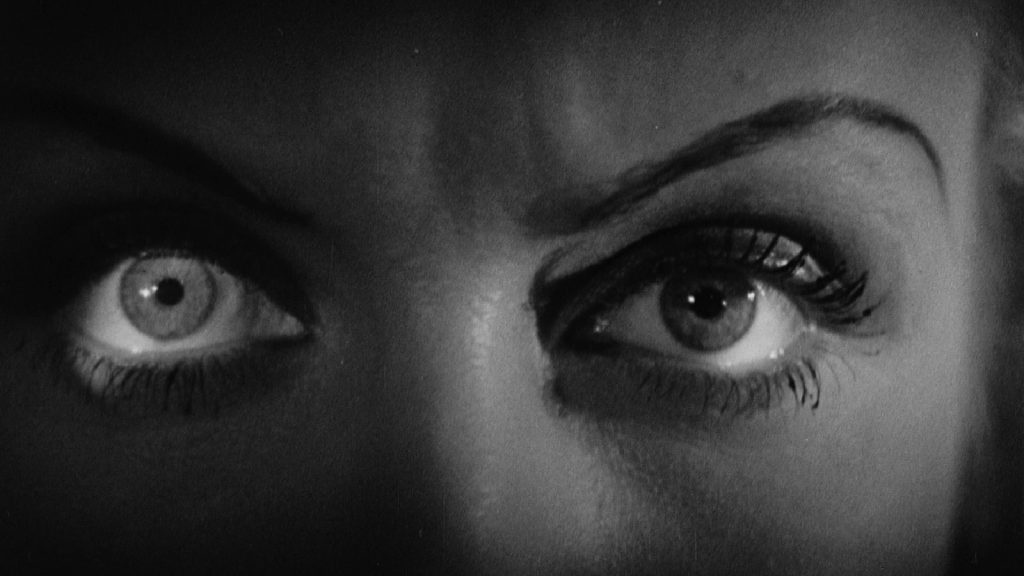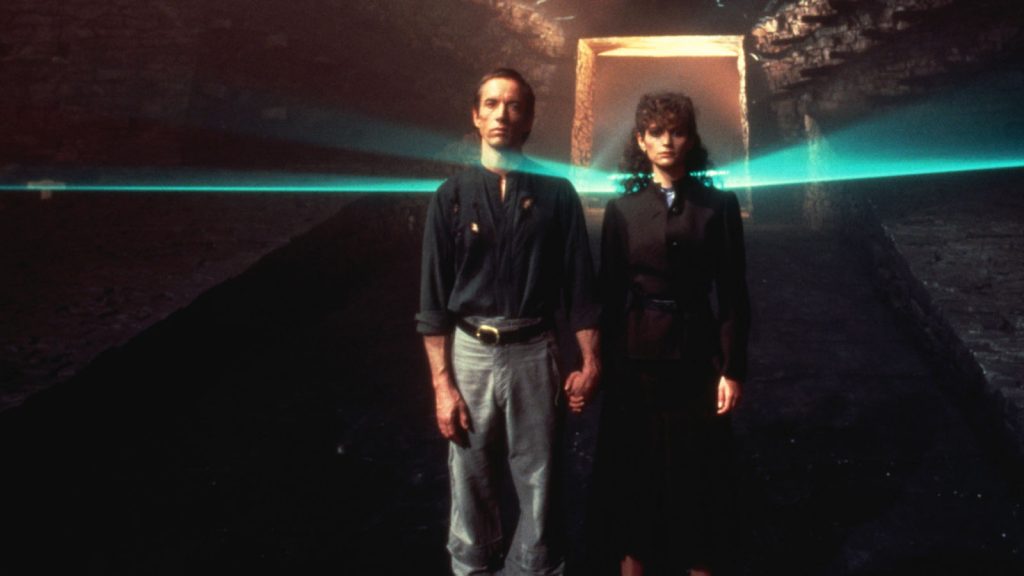🩸 Warning: Please proceed with caution if you haven’t seen the film. This piece reveals major plot points and twists. 🩸
After he’d fundamentally abandoned Hollywood moviemaking and cast his lot with the nascent medium of television, reinventing himself as a producer and host of live dramas, Robert Montgomery did something unheard-of: he took on the role of media consultant to President Dwight Eisenhower, instructing him on how to look poised and dignified on-camera, and alerting him to trade secrets that only a seasoned performer would know. Starting in 1954, Montgomery even had an office in the White House. Eisenhower firmly believed that if Richard Nixon had capitalized on Montgomery’s know-how prior to his infamous televised debate with John F. Kennedy in 1960, he would’ve won the election.
I kept thinking of this odd historical footnote as I revisited Montgomery’s greatest screen showcase, Richard Thorpe’s underappreciated thriller Night Must Fall (1937), because his character, the charmingly murderous Danny, is defined by his awareness of how others perceive him. His fiancée notes that “all the time he’s got an eye on what you’re thinking of,” while his employer’s niece remarks that he always seems to be acting—an observation he readily confirms. Because personal allure is his stock-in-trade, enabling his ascent from hotel page boy to caretaker (and chief flatterer) of an aged, widowed hypochondriac, it serves him well to look his best at all times and tell people what they want to hear. The same qualities that won Ike a second term under Montgomery’s tutelage win Danny a coveted place in the Bramson household—right behind the wheelchair of the wealthiest woman in the village.
Charm helped Montgomery rise swiftly in Hollywood. Already a veteran of the New York stage when he made his screen debut in 1929, the 25-year-old MGM contract player impressed leading lady Norma Shearer, and at her request, appeared opposite her in a series of sophisticated star vehicles including The Divorcee (1930). That film earned Shearer a Best Actress Oscar, but it proved no less bountiful for Montgomery, who found himself in great demand as Depression-era audiences flocked to the romantic melodramas and cocktail-hour comedies in which he was initially typecast. By the end of 1931, his roster of leading ladies had grown to include Joan Crawford, Greta Garbo, and Constance Bennett.

In this writer’s opinion, at least, the actor was ill-suited to the urbane, bon mot–dispensing roles that his peers William Powell and Cary Grant built their careers on; with Montgomery, there was always a faint stiffness, a hint of petulance (even with his much-admired turn in the 1941 supernatural comedy Here Comes Mr. Jordan). Perhaps Montgomery shared this appraisal, since he seized every chance to slip out of his silk bathrobe and into more challenging material. He fought hard to play one of the convicts in George Hill’s groundbreaking prison drama The Big House (1930), but while his performance was well-received by critics, it did not lead to similar fare. Seven years later—by which time he was the crusading president of the Screen Actors Guild—Montgomery had become such a thorn in the side of studio head Louis B. Mayer, by constantly demanding substantial projects, that Mayer agreed to let him headline Night Must Fall (which the star had seen on Broadway, featuring the play’s author Emlyn Williams as Danny), hoping it would flop and quell Montgomery’s ambitions. In the latter’s own words: “They okayed my playing in it because they thought the fan reaction to me, in such a role, would humiliate me.”
It was his doubters and detractors who were humiliated. As Danny, Montgomery delivers one of the most transfixing performances of the 1930s—and by far the most chilling of his career—layering sociopathy and class resentment so dexterously that his portrayal anticipates In Cold Blood and Room at the Top in equal measure. He resists the lure of explicit menace that would’ve quickly exhausted the character’s potential and made the bulky film tedious. Instead, his Danny is so charismatic and (self-servingly) attentive that we believe it when he endears himself to the dyspeptic Mrs. Bramson (Dame May Whitty, brilliantly re-creating her stage role), becoming like a son to her and winning over everyone in her well-staffed abode including the cat—except, that is, for her mistreated and suspicious niece, Olivia (neophyte Rosalind Russell, who would prove better suited to the frothy farces Montgomery eschewed).
Danny and Olivia’s evolving relationship supplies the film’s dramatic current, as she takes an instant dislike to his impudence and guile, and soon comes to believe he’s responsible for the recent disappearance of a guest at his hotel (a hunch that’s substantiated when the woman’s body turns up decapitated—and Olivia remembers a locked hatbox of unusual heft in Danny’s room). Yet she not only helps to cover up his harmless fabrications but also lies to protect him from the police, and keeps returning to the Bramson house even when every instinct she has tells her to flee. Something about this beguiling young Irishman compels her to self-imperilment; maybe it’s pity for his lowly origins that rule out all careers but servitude and embitter him in ways he can only confess to her. More likely, though, it’s the elements of volatility and danger that he brings to her comfortably monotonous existence, where her only romantic prospect is the dull attorney her aunt summons when she wants to redraft her will.

Montgomery makes a dramatic first impression, striding confidently into the all-female environs clad in a rugged cap and boots, cigarette dangling insouciantly. Mrs. Bramson is predisposed against Danny (as indeed she’s predisposed against everyone), believing him to be a bounder who’s done wrong by one of her servants, Dora (Merle Tottenham). Immediately, he sizes up the situation, claiming responsibility for his indiscretions and promising to marry the girl while expressing concern for the old woman’s ailments (which he aptly clocks as psychosomatic). He cleverly intuits all her weaknesses and presents a composite of traits she admires, passing himself off as underprivileged but industrious, repentant but resilient (“What’s done is done, that’s my motto”), compassionate toward his elders and their frailties, and devoted to the memory of his mother—to whom he likens Mrs. Bramson in the coup de grâce of his ingratiation scheme (“She had the same kind look as you have, and the same eyes”). He also, when prompted, supplies a description of the missing woman marked by startling sensitivity and detail. Clearly this new arrival is instinctually intelligent, and nothing escapes his notice—not the cash in Mrs. Bramson’s safe, or the fact that wary Olivia’s seduction will require more stealth than that of her vain, gullible aunt.
Of the many unorthodox acting choices made by Montgomery, perhaps the most effective is his decision to make Danny so outwardly pleasant. He’s almost always smiling, but it’s not a ghoulish Joker-grin. It’s a cheerful countenance that invites trust. Even when his words bear the unmistakable threat of violence (“I’d sooner have anything than a spy,” he states when Olivia is caught searching his room, “…bar a murderer, of course”), his face is friendly and open—the effect of which is doubly unnerving, since there’s never any real possibility of his innocence. Montgomery’s Irish brogue is imperfect but more than serviceable, and crucially does not dominate his subtle characterization but shifts from lilting to sinister as needed. Danny is always acutely aware of his low standing in the Bramson ménage, where everyone initially holds more authority than he does. (Even Dora has seniority, and sympathy for her tarnished reputation.) But before long, he’s gained the upper hand with his mesmeric ability to read people, stunning everyone with his insights and becoming the man each of them needs him to be—a devoted filial surrogate to Mrs. Bramson, a promise of domestic stability to Dora, and a perversely enticing diversion to Olivia.
Only to her can Danny speak truthfully about growing up an orphan on the docks, inhabiting a self-constructed world of ambition and fantasy, while feeling the sting of condescension from those who look through him “as though I was a dirty window.” Yet his honest confession detours into transparent falsehoods and crocodile tears. Montgomery’s masterfully ambiguous turn keeps us (and Olivia) unsure of when he’s unburdening himself of genuine traumatic memories and when he’s making them up because he needs her cooperation. Their bond is uncommonly mature and complex for any cinematic era, rooted not in a wholesome romantic connection but in a morbidly poetic nature they both share—and perhaps a mutual animus for old Mrs. Bramson and all she embodies.
Danny’s final moments on-screen—desperate, doomed, yet curiously relieved at not having to “act” anymore—represent the pinnacle of Montgomery’s career, and brought him a richly deserved Oscar nomination. Among subsequent projects, his understated turn as a World War II PT-boat commander in John Ford’s They Were Expendable (1945) derived authenticity from the fact that he’d lately been one himself. His swan song at MGM was also his directorial debut, Lady in the Lake (1946), a labored experiment in subjective camerawork that invites us to view the movie’s events through his character’s eyes, and only see his face in reflective surfaces. Later filmmaking forays took him abroad and deep into the noir genre, before TV and politics usurped his attention. Throughout it all, Montgomery manifested many of the qualities we note in Danny: a constant, restless striving for his own betterment; an almost uncanny talent for persuasion; a pragmatic, self-remaking spirit; and a magnetism people lost their heads over. 🩸

is the copy editor for Field of Vision’s online journal Field Notes and for Film Comment magazine, as well as a frequent contributor to Film Comment, Metrograph’s Journal, and other publications. He wrote a thesis on depictions of old age in American cinema.
Sometimes all it takes is one sentence to demolish everything you thought you knew about a person.
BY STEVEN MEARS | February 7, 2024
When Bette Davis as Jane served Joan Crawford’s Blanche her pet bird for “din-din,” a new strain of horror was born.
BY STEVEN MEARS | April 19, 2022
You can lose everything else, but you can’t lose your talent,” proclaims “Baby” Jane Hudson (Bette Davis), a former child star plotting...
BY STEVEN MEARS | October 31, 2021

This pre-Code offering packs a lot of story into its typically brisk running time, with several plot threads weaving together a (not always successful) tapestry of spooky and criminal doings.
READ MORE >
BY ANN OLSSON | Month 00, 2021

In what could be the fastest-resulting rape revenge movie, a drunken lout brutally forces himself on Ida, the young woman who doesn't return his affections, during a party over Labor Day.
READ MORE >
BY LAURA KERN | Month 00, 2021

Beast is a lot of movies in one package - fractured fairy tale, belated-coming-of-age story, psychological drama, regional horror film - but above all it's a calling card for its leading lady, Jessie Buckley.
READ MORE >
BY LAURA KERN | Month 00, 2021